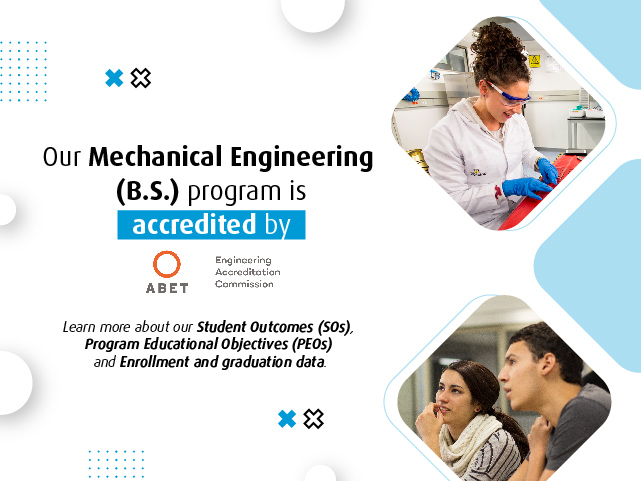ABET
Since October 2010, the Mechanical Engineering Undergraduate Program at the Universidad de los Andes was accredited by the Engineering Accreditation Commission (EAC) of ABET a recognized international accrediting body of higher education programs in applied sciences, informatics, engineering, and technology.
Program Educational Objectives
The Educational Objectives of the Mechanical Engineering Undergraduate Program emphasize the expected impact of ME alumni on the society. Within the first five years of their professional life, ME graduates will: :
- Contribute to the industrial and social development of the country, using their robust education in mechanical engineering, which they will apply to solve relevant problems that affect the society.
- Participate in engineering projects and startups from an integral perspective, always acting within an ethical and responsible framework.
- Develop innovative solutions by combining their broad vision of the technological environment, creativity, and capabilities for collaborating within interdisciplinary teams.
- Strive to continuously improve by the permanent development of their skills, knowledge, and abilities both autonomously and through formal graduate studies.
Students Outcomes
Student outcomes describe what students are expected to know and be able to do by the time of graduation. These relate to the knowledge, skills, and behaviors that students acquire as they progress through the program.
- an ability to identify, formulate, and solve complex engineering problems by applying principles of engineering, science, and mathematics
- an ability to apply engineering design to produce solutions that meet specified needs with consideration of public health, safety, and welfare, as well as global, cultural, social, environmental, and economic factors
- an ability to communicate effectively with a range of audiences
- an ability to recognize ethical and professional responsibilities in engineering situations and make informed judgments, which must consider the impact of engineering solutions in global, economic, environmental, and societal contexts
- an ability to function effectively on a team whose members together provide leadership, create a collaborative and inclusive environment, establish goals, plan tasks, and meet objectives
- an ability to develop and conduct appropriate experimentation, analyze and interpret data, and use engineering judgment to draw conclusions.
- an ability to acquire and apply new knowledge as needed, using appropriate learning strategies.
| Year | Enrollment | Graduates |
| 2022 | 650 | 71 |
| 2021 | 647 | 52 |
| 2020 | 661 | 67 |
| 2019 | 650 | 65 |
| 2018 | 700 | 45 |

